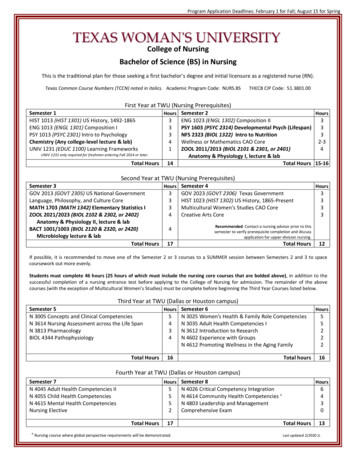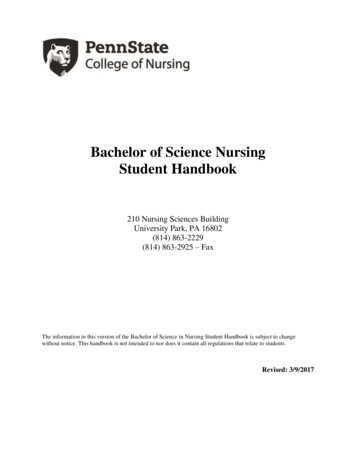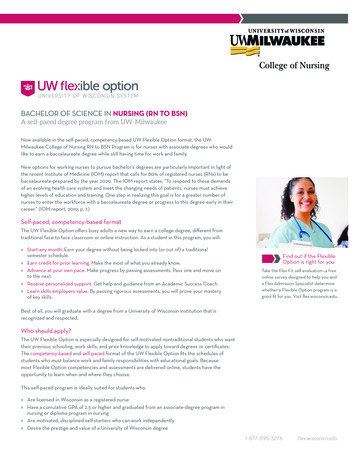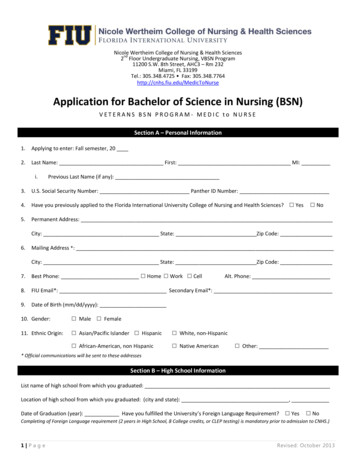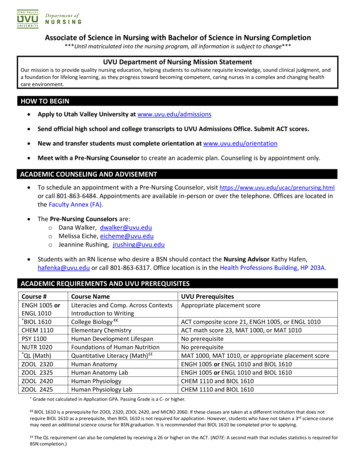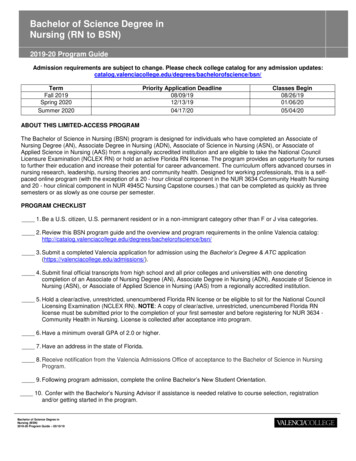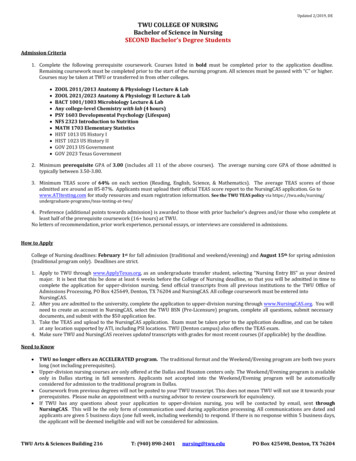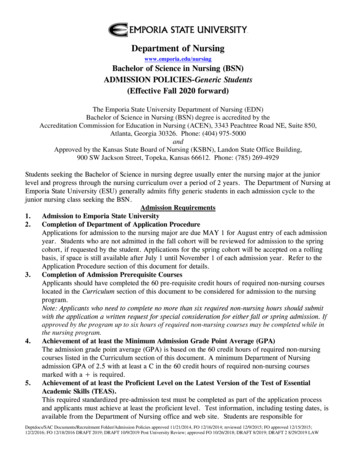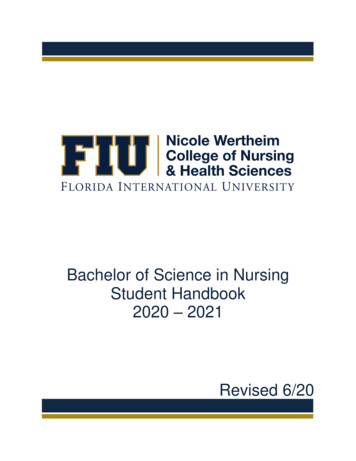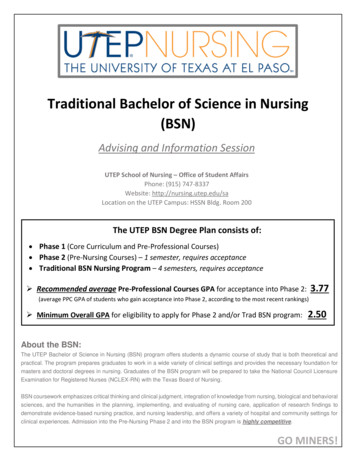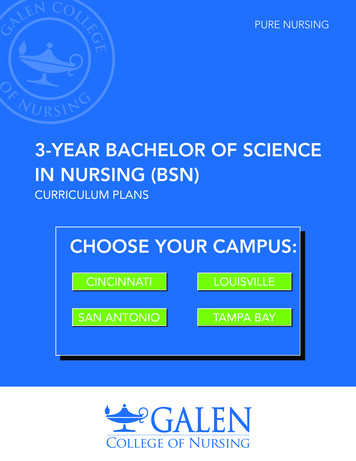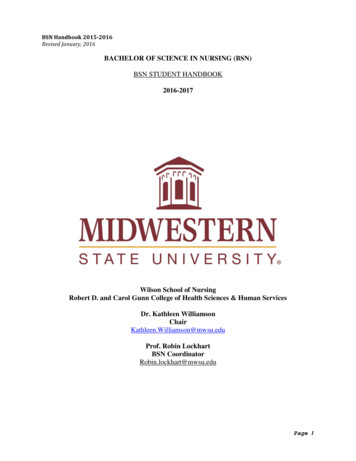
Transcription
BSN Handbook 2015-2016Revised January, 2016BACHELOR OF SCIENCE IN NURSING (BSN)BSN STUDENT HANDBOOK2016-2017Wilson School of NursingRobert D. and Carol Gunn College of Health Sciences & Human ServicesDr. Kathleen WilliamsonChairKathleen.Williamson@mwsu.eduProf. Robin LockhartBSN CoordinatorRobin.lockhart@mwsu.eduPage 1
BSN Handbook 2015-2016Revised January, 2016TABLE OF CONTENTSCONTENTSMISSION and VISION STATEMENTSWILSON SCHOOL OF NURSING MISSION and GOALSPROGRAM INFORMATIONProgram ApprovalProgram AccreditationEligibility for LicensureRecommendation for LicensureCode of Academic and Clinical ConductAcademic DishonestyACADEMIC POLICIESGrade ScaleAPA FormatAcademic AdvisingTuition, Fees, Financial AidWorking for CompensationCourse FailureAdmission PoliciesTransfer PoliciesProgression PoliciesProgram Dismissal AppealProgram Time LimitsNURSING PROGRAM REQUIREMENTSTechnology RequirementsDress CodeClinical ComplianceClinical FailureCriminal Background CheckCertified ProfileProfessional BehaviorBSN CompetenciesStudent ResourcesGraduation 1919202121Page 2
BSN Handbook 2015-2016Revised January, 2016Midwestern State University BSN Student HandbookMission Statements and Nursing GoalsUniversity Mission StatementMidwestern State University is a leading public liberal arts university committed to providingstudents with rigorous undergraduate and graduate education in the liberal arts and theprofessions. Through an emphasis upon teaching, augmented by the opportunity for students toengage in research and creative activities alongside faculty and to participate in co-curricular andservice programs, Midwestern State prepares its graduates to embark upon their careers or pursueadvanced study. The university’s undergraduate education is based upon a comprehensive artsand sciences core curriculum. The understanding that students gain of themselves, others, and thesocial and natural world prepares them to contribute constructively to society through their workand through their private lives.College of Health Sciences and Human ServicesVision/MissionIn keeping with Midwestern State University’s mission to provide students with rigorousundergraduate and graduate education in the liberal arts and the professions, the College ofHealth Sciences and Human Services seeks to be a premiere provider of health sciences andhuman services education on a state, national, and international level by providing learners withtools for success through: Student-centered undergraduate and graduate professional education built upon a strongliberal arts foundation;Engagement in traditional and applied research opportunities alongside faculty acrossdisciplines and within their chosen professions;Cutting edge educational programs that meet the needs of our global community;Recognition and respect for diversity of thought;Interdisciplinary collaboration with professionals in the global community;Emphasis on scholarly teaching, practice, scientific inquiry, and service;Ethical professional practice and an appreciation for continuous life-long learning.Page 3
BSN Handbook 2015-2016Revised January, 2016Wilson School of Nursing MissionIt is the mission of the Wilson School of Nursing (WSON) to prepare nurses who will providecompetent and compassionate health care to individuals, families, groups, and communities. Thenursing faculty values teaching /learning in an individualized, collegial environment inclusive ofa variety of teaching methodologies. Building on a liberal arts foundation, this approach to bothundergraduate and graduate nursing education develops students as leaders through collaborativeidentification of issues and the implementation of innovative, creative solutions to the provisionof health services.Wilson School of Nursing GoalsSuccessful graduates of the Wilson School of Nursing should be able to: Compare favorably with national norms for professional practice Be employed in professional practice Manage multiple, complex clients in a variety of settings Demonstrate leadership within the professional disciplineThe Wilson School of Nursing at MSU will provide: Student-centered education Innovative educational programs that meet the needs of our local and global community Interdisciplinary collaboration with the practice community Scholarly teaching, practice, inquiry, research, and servicePROGRAM INFORMATIONProgram ApprovalThe Wilson School of Nursing is approved by the Texas Board of Nursing (BON) under theauthority of the Texas Administrative Code, Title 22, Part 11, Chapter 215: Professional NursingEducation. The purpose of the Board approval process is to protect the public from fraudulentprograms that do not adequately prepare graduates to practice nursing safely and competently(BON, 2013). Nursing practice in Texas by licensed nurses flows along a scope of practicecontinuum based upon educational preparation. While selected aspects of nursing care may beassigned or delegated by licensed practicing nurses to ancillary persons such as nursing assistantsor aides, LVNs and RNs currently form the core in the roles identified as members of theprofession, providers of patient-centered care, patient safety advocates, and members of thehealth care team (BON, 2013).The curricula of each of the nursing programs (LVN, ADN, BSN) differ and the outcomes of theeducational levels dictate a differentiated set of essential competencies of graduates: theDifferentiated Essential Competencies (DECs). The DECs contain 25 core competencies whichfall under the four nursing roles: Member of the Profession Provider of Patient-Centered CarePage 4
BSN Handbook 2015-2016Revised January, 2016 Patient Safety AdvocateMember of the Health Care TeamThe DECs are “written to guide nursing programs to meet the approval criteria established by theBON and to ensure that programs prepare graduates to provide safe, competent care to the peopleof Texas” (BON, 2010, p. vii). The faculty of the WSON ensures that all of the DECs areincorporated into the curricula.Program AccreditationThe Wilson School of Nursing is a member of the American Association of Colleges of Nursing(AACN) and is accredited by the Commission on Collegiate Nursing Education (CCNE). As amember of AACN, the WSON endorses the document The Essentials of BaccalaureateEducation for Professional Nursing Practice, which defines the essential knowledge, values, andprofessional behaviors expected of a baccalaureate nursing graduate (AACN, 2008). The facultyof the WSON uses the Essentials as a framework to develop, define, evaluate, and revise thenursing curricula. The Essentials are addressed throughout the curricula.Eligibility for LicensureSuccessful completion of the WSON pre-licensure BSN programs enables the graduate to applyfor licensure with the Texas Board of Nursing (BON) and take the NCLEX-RN examination forlicensure. After graduation, the Chair of the Wilson School of Nursing will sign an affidavit ofprogram completion and send it to the BON. The graduate will apply for licensure with the BONand should register to take the NCLEX-RN as outlined in The 8 Steps of the NCLEX found athttps://www.ncsbn.org/2015 NCLEX Information Flyer.pdf.Applicants for NCLEX-RN and licensure in Texas are required to submit a complete and legibleset of fingerprints in a format prescribed by the BON for the purpose of obtaining a criminalhistory from the Texas Department of Public Safety and the Federal Bureau of Investigation(Section 301.252 (b) and Section 301.252 (e) of the Texas Occupations Code). Students in theWSON are required to complete criminal background checks prior to acceptance into the nursingprogram. Students with eligibility issues that could prevent them from taking the NCLEX-RNexamination and being licensed after completion of the nursing program are required to completea Declaratory Order application. The Declaratory Order process permits the BON to makedecisions regarding an applicant’s eligibility for licensure prior to entering or completing anursing program. For questions on eligibility, please make an appointment with the Chair of theWSON.Recommendation for LicensureUniversity recommendation for application for RN licensure will be made upon satisfactorycompletion of the nursing curriculum.Code of Academic and Clinical ConductThe Wilson School of Nursing affirms and adopts the National Student Nurses’ Association(NSNA) Code of Academic and Clinical Conduct for nursing students.Page 5
BSN Handbook 2015-2016Revised January, 2016Academic DishonestyIn concert with the University’s Honor Creed, included in the MSU Student Handbook (p.10),the nursing faculty does not condone academic dishonesty in any form and they consider it aserious offense which may result in automatic failure of a class and/or removal from theprogram.Academic dishonesty (cheating) is defined by the faculty to include, among other items, cheatingon examinations, removing information about exam content from the classroom/offices, usingtest banks, collusion, and plagiarism.Plagiarism is further defined as "the act of using source materials of other persons (eitherpublished or unpublished) without following the accepted techniques of crediting or thesubmission for work not the individual's to whom credit is given. (MSU Student Handbook,Appendix E, page 120, Item b). Offending material that may constitute plagiarism includes, butis not limited to, the following: Bibliography cards, formal papers, book reports, written nursingcare plans, etc. The accepted format for crediting sources of material in the school of nursing isthe APA 6th edition.ACADEMIC POLICIESGrading Scale for Undergraduate Courses90-100 .A80-89 . B74-79 . C65-73 .D64 & below . FAPA FormatAll written work will be formatted according to APA style as stipulated in the organization’smanual: American Psychological Association. (2009). Publication Manual of the AmericanPsychological Association (6th ed.). Washington, DC: Author.Academic AdvisingAcademic advisement at regular intervals is strongly recommended with the Gunn College ofHealth Sciences & Human Services Academic Advisor who is located in Bridwell Hall, room102. In addition, every BSN student is encouraged, by the end of the second semester of thejunior year, to initiate a mentoring relationship with a member of the nursing faculty.Students are advised to obtain and review the Midwestern State University UndergraduateCatalog. The BSN Student Handbook is developed with the understanding that university-widepolicies will be found in the catalog. The student is responsible for information in the BSNStudent Handbook, MSU Student Handbook, and the Midwestern State UniversityUndergraduate Catalog. Course descriptions are located in the university catalog.Page 6
BSN Handbook 2015-2016Revised January, 2016Refer to the Catalog for Course Tuition, Fees and Financial AidTuition and fees are published in the current university catalog and class schedule bulletin.Financial assistance is available for qualifying students through the financial aid office located inthe Hardin building.Nursing scholarships are available. Applications may be obtained on the Wilson School ofNursing web page (http://www.mwsu.edu/academics/hs2/nursing/index). The GPA required tobe eligible for a scholarship is 3.0.Refer to the General Information section of the catalog for university policies such as: Antidiscrimination, Student Right to Know, and Campus Security. Testing Services are discussed inthe catalog. Individuals can access the Testing Services web page at http://testing.mwsu.edu.Students interested in any phase of testing services are invited to contact the Testing Office at(940) 397-4676. Policies and procedures are found in the Office of the Registrar section thatconcerns: Texas Success Initiative, Grade Reporting, Appeal of a Course Grade, as well as alisting with explanation for commonly used terms.Policy for Nursing Students Who Work for Compensation in a Health Care FacilityStudents enrolled in the nursing program are encouraged to limit the amount of time that theywork for compensation in a health care facility. If the student chooses to work for compensation,this constitutes a private negotiation and contract between the clinical facility and student, andthus, the clinical facility assumes the legal responsibility for the action of the student duringthose times of employment. Under no circumstances should the student identify himself/herselfas a nursing student, either in writing or by dress, while working for compensation for a clinicalfacility. This includes wearing of the official Midwestern State University Nursing emblem orname tag, or signing charts identifying himself/herself as a nursing student.The Midwestern State University BSN Program assumes no responsibility for the performanceand action of the nursing student while in the clinical facility other than during those timesspecified as laboratory learning experiences assigned/approved by MSU nursing faculty.It is the responsibility of the student to regulate his/her own outside activities, including workingfor compensation, in order that appropriate amounts of time are reserved for outside study andclinical rotations to ensure the accomplishment of course objectives and educational goals.If a student works at a clinical setting where they are assigned, please be advised that the studentcan NOT use the computers as a student with their employee login and vice versa. This is aviolation of policy and will have consequences at both the facility and MSU.Course Failure PolicyThe faculty of the WSON reserves the right to recommend to the Nursing Chair and the Dean ofthe Gunn College of Health Sciences and Human Services withdrawal of a student from thenursing program for health, legal, or academic reasons, particularly if patient care is jeopardized.In addition, the student must perform within the following:Page 7
BSN Handbook 2015-2016Revised January, 2016 NSNA Code of Academic and Clinical Conduct for nursing students Ethics.aspx)ANA Code of Ethics /EthicsStandards/CodeofEthicsforNurses)Texas Nursing Practice Act (seehttps://www.bon.texas.gov/laws and rules nursing practice act.asp)The student must pass both the didactic and clinical portions to pass the course if a clinicalcomponent is attached to the course.Admission Policies Prior to enrolling in general education courses at another college/university, the studentshould seek guidance by the Gunn College of Health Sciences and Human ServicesAcademic Advisor to assure equivalency with university requirements. A minimum grade of C is required in the following science courses: Anatomy andPhysiology I and II, Pathophysiology, Microbiology, and Chemistry. Pre-licensure students admitted into the program who have not completedPathophysiology, must have completed Anatomy and Physiology within the last fiveyears. Pre-licensure students admitted into the program who have completedPathophysiology, must have completed Pathophysiology within the last five years. Students may not enroll more than twice in any one science (including Fs or Ws) for thestudent to be admitted to nursing; no more than two sciences courses may be repeated. Nursing pre-requisites and electives may be repeated only once following either a gradeof less than C or withdrawal. A student may not repeat for credit a course in which a grade of C/C- or better wasawarded. Students should take a full academic load of at least twelve semester hours of courseworkeven if they are repeating a course. MSU students who are progressing satisfactorily will be given priority for all classes.Transfer students will be considered on an “as available” basis. Students must achieve a cumulative GPA of 3.0 or higher and a grade of C or higher inall core and pre-requisite courses listed on the degree plan demonstrating a pattern ofacademic success prior to admission. Students on academic probation from the university will not be admitted to the program. Students must complete the following courses prior to beginning the nursing program.Students may apply to the program while enrolled in core/or pre-requisite courses. Thestudent must successfully complete the courses in order to progress through theapplication process. If one or more core and/or pre-requisite courses are in progressduring the application process, the student may be offered a conditional admission.Page 8
BSN Handbook 2015-2016Revised January, 2016 Admission is contingent on satisfactorily completing the course(s) and maintaining aGPA of 3.0 prior to enrolling in the program.o BIOL 1133 Anatomy and Physiology Io BIOL 1233 Anatomy and Physiology IIo BIOL 2144 Microbiologyo SOCL 1133 Introductory Sociologyo CHEM 1203 General Organic- Biological Chemistryo Communication (core component)o PSYC 1103 General Psychologyo PSYC 3233 Developmental Psychologyo Mathematics (core component)o Language, Philosophy and Culture (core component)o Government and Political Science (core component)o Creative Arts (core component)o American History (core component)o Undergraduate Inquiry and Creativity (core component)Students enrolling in the ACCEL or RN-BSN and BSN-MSN Transition programs mustbe Texas Core Curriculum complete prior to enrollment into the program.Students enrolling in the RN to MSN Transition program must declare intent to pursuethe RN to MSN program upon application to the Wilson School of Nursing. See thegraduate catalog application deadline, admission requirements, and further details on theMSN programs available. Students must be admitted to the MSN program prior toenrolling into any of the RN Transition courses if planning to pursue the RN to MSNprogram.Transfer Policies Admission and progression requirements for transfer students are identical to those ofthe MSU BSN Program students. In addition, transfer students who wish to transfer nursing courses from anothernursing program must meet the following requirements:o Nursing courses to be transferred were completed at a nationally accreditednursing program.o A grade of C or better was earned in all nursing courses.o Written statement from the Dean of the program is provided stating thestudent is in good academic standing within the university and the nursingprogram and is eligible to continue in the program.o Student must submit a well-organized notebook to the Chair of the WilsonSchool of Nursing that includes the letter of good standing, the admissionapplication, and the course descriptions, course content outlines and syllabifor the courses requesting transfer.Page 9
BSN Handbook 2015-2016Revised January, 2016 o Courses taken without formal admission within the transferring program willnot be accepted for courses requiring formal admission in the Wilson Schoolof Nursing.o All potential transfer students are reviewed by the Wilson School of NursingStudent Affairs Committee, which will make recommendations regardingadmission and placement.Transfer credit will be evaluated according to University policy.Students planning to take general education courses at another college beforetra
In concert with the University’s Honor Creed, included in the MSU Student Handbook (p.10), the nursing faculty does not condone academic dishonesty in any form and they consider it a serious offense which may result in automatic failure of a class and/or removal from the program. Academ
